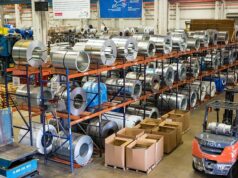
- South Korea, Tajikistan and Tuvalu the latest countries to accede to a UNESCAP treaty to speed up the shift to digital trade to avoid business disruptions in times of crisis
- Full implementation of the treaty is seen to reduce trade costs by 13% on average across Asia Pacific, ranging from 7% in developed economies to 26% in Pacific islands
- The treaty is the first UN accord on accelerating the digital trade facilitation measures
- Another UNESCAP regional forum on November 22 focused sharply on how to enhance transport connectivity in Asia Pacific and make it greener and inclusive
South Korea, Tajikistan and Tuvalu acceded recently to a United Nations treaty to speed up the shift to paperless trade to avoid business disruptions in the event of crises, such as the COVID-19 pandemic.
Their accession to the Framework Agreement on Facilitation of Cross-border Paperless Trade in Asia and the Pacific more than doubled the treaty membership to 11 countries between 2021 and 2022, the UN Economic and Social Commission for Asia and the Pacific (UNESCAP) reports.
The number of countries that have ratified the 22-month-old UN treaty on paperless trade so far represents roughly 20% of UNESCAP’s 53 members.
Bangkok-headquartered UNESCAP said in a press release on December 15 that the treaty is the first UN agreement dedicated entirely to accelerating the implementation of digital trade facilitation measures for trade and development.
“The COVID-19 pandemic not only had huge disruptions on international trade and supply chains, it also underscored the importance of digital technology and of finding new ways of doing business,” UNESCAP said.
“Almost all international trade today is facilitated and enabled by digital and communication technologies.”
UNESCAP said the Framework Agreement shows the Asia-Pacific region’s strong political will and leadership in digitalizing trade procedures. Membership in the treaty is diverse and inclusive, covering least developed countries such as Timor-Leste, landlocked developing countries such as Mongolia, and leading economies such as China.
The agreement came into force on February 20 last year in accordance with Article 19 when the Philippines and other ESCAP member states Azerbaijan, Bangladesh, China, Iran ratified or acceded to it. Timor-Leste became the sixth Party when it acceded on April 5, 2022.
Countries started implementing the treaty on April 27, 2021 at the first session of the Paperless Trade Council convened in Bangkok under UNESCAP auspices.
“The COVID-19 pandemic has seriously disrupted global supply chains and accentuated the importance of international trade as a key means of implementation of sustainable development,” said Armida Salsiah Alisjahbana, UN undersecretary-general and executive secretary of ESCAP.
“As the pandemic continues and new crises unfold, accelerating the implementation of trade facilitation measures and digitalizing procedures is more crucial than ever to make trade more resilient and inclusive in Asia and the Pacific.”
Unlike many other international treaties, the UN treaty on paperless trade Framework Agreement is action-oriented and includes a provision on institutional arrangements for forming different levels of bodies for its implementation, including the Council, Standing Committee and working groups. It encourages parties to meet regularly to work jointly on issues for facilitating cross-border paperless trade.
Additional benefits associated with the cross-border digitalization of trade procedures include reductions in greenhouse gas emissions equivalent to planting 400 million trees, and increased transparency for addressing illicit financial flows.
Forum on greener transport connectivity
In an earlier UNESCAP regional forum in Bangkok on November 22 focused sharply on how to enhance transport connectivity in Asia and the Pacific and make it greener and inclusive, particularly in the aftermath of the pandemic and other crises.
“Our estimates show that under business as usual, Asia and the Pacific will experience a drastic increase in carbon dioxide emissions, up to 87% in some parts of our region,” Alisjahbanasaid in her opening remarks to the seventh session of the Committee on Transport.
“But the situation can change drastically if governments implement policy measures that encourage changes in the behavior of transport users, uptake of cleaner energy and vehicle technologies, digitalization to improve transport efficiency, and infrastructure investment to help meet environmental and social development goals.”
Government officials, representatives of international organizations, civil society and other stakeholders took stock of the current status of regional transport and discussed strategic issues of transport development and the formulation of regional policies to advance sustainable, safe, resilient and low-carbon transport in the region.
Considering the pandemic and other disruptive events, preserving and enhancing land and maritime transport connectivity must go hand-in-hand with addressing the environmental and social dimensions of freight transport activities and bridging the widening connectivity gaps in Asia and the Pacific, UNESCAP said.
The committee deliberated on enhancing sustainability, resilience and efficiency of freight transport along the regional transport network, including the Asian Highway Network, the Trans-Asian Railway Network and Dry Ports.
The committee also discuss regional approaches to sustainable, multimodal freight transport and to connecting to global supply chains through land and shipping corridors.
RELATED READ: First in ASEAN, PH accedes to UN treaty on digital trade








